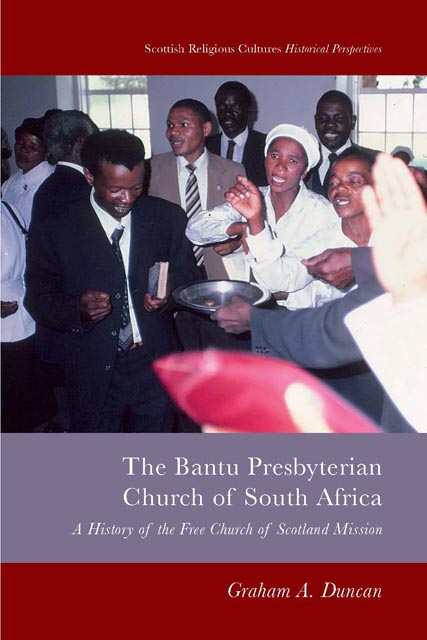Book contents
- Frontmatter
- Contents
- Acknowledgements
- Timeline
- A Presbyterian Anthem
- Introduction
- 1 Background to this Study
- 2 The Origins and Early Development of Scottish Presbyterian Mission in South Africa, 1824–65
- 3 Rev. Tiyo Soga (1829–71): A Paragon of Early Indigenous Leadership
- 4 The Role of Mission Councils in the Scottish Mission in South Africa, 1864–1923
- 5 The Rev. Edward Tsewu’s Dispute with the Free Church of Scotland Mission
- 6 The Mzimba Secession, 1898: A South African ‘Disruption’
- 7 Presbyterianism in South Africa, 1897–1923: To Unite orNot to Unite?
- 8 Preparations for the Formation of the Bantu Presbyterian Church of South Africa, 1897–1919
- 9 The Formation of the Bantu Presbyterian Church of South Africa, 1920–3
- 10 Mission to Church – Church to Mission: The First Ten Years, 1923–33
- 11 Reaching Out: The Bantu Presbyterian Church in South Africa and the Presbyterian Church of South Africa and Ecumenism, 1923–39
- 12 The Bantu Presbyterian Church in South Africa and Ecumenism, 1940–99
- 13 The End of Mission Councils: The Church of Scotland South Africa Joint Council, 1971–81
- 14 A Young Church in Mission or Maintenance Mode?: The Bantu Presbyterian Church of South Africa, 1923–99
- 15 The Bantu/Reformed Presbyterian Church and Socio-political Issues
- 16 Bantu/Reformed Presbyterian ChurchWomen in Leadership in Ministry
- Conclusion: Indigenous Presbyterians and Missionaries –Transferring Contending Roles and Responsibilities
- Bibliography
- Index
13 - The End of Mission Councils: The Church of Scotland South Africa Joint Council, 1971–81
Published online by Cambridge University Press: 26 November 2022
- Frontmatter
- Contents
- Acknowledgements
- Timeline
- A Presbyterian Anthem
- Introduction
- 1 Background to this Study
- 2 The Origins and Early Development of Scottish Presbyterian Mission in South Africa, 1824–65
- 3 Rev. Tiyo Soga (1829–71): A Paragon of Early Indigenous Leadership
- 4 The Role of Mission Councils in the Scottish Mission in South Africa, 1864–1923
- 5 The Rev. Edward Tsewu’s Dispute with the Free Church of Scotland Mission
- 6 The Mzimba Secession, 1898: A South African ‘Disruption’
- 7 Presbyterianism in South Africa, 1897–1923: To Unite orNot to Unite?
- 8 Preparations for the Formation of the Bantu Presbyterian Church of South Africa, 1897–1919
- 9 The Formation of the Bantu Presbyterian Church of South Africa, 1920–3
- 10 Mission to Church – Church to Mission: The First Ten Years, 1923–33
- 11 Reaching Out: The Bantu Presbyterian Church in South Africa and the Presbyterian Church of South Africa and Ecumenism, 1923–39
- 12 The Bantu Presbyterian Church in South Africa and Ecumenism, 1940–99
- 13 The End of Mission Councils: The Church of Scotland South Africa Joint Council, 1971–81
- 14 A Young Church in Mission or Maintenance Mode?: The Bantu Presbyterian Church of South Africa, 1923–99
- 15 The Bantu/Reformed Presbyterian Church and Socio-political Issues
- 16 Bantu/Reformed Presbyterian ChurchWomen in Leadership in Ministry
- Conclusion: Indigenous Presbyterians and Missionaries –Transferring Contending Roles and Responsibilities
- Bibliography
- Index
Summary
Introduction
The Church of Scotland South Africa Joint Council (CoSSAJC) was finally laid to rest on 1 May 1981, fifty-eight years after the formation of the Bantu Presbyterian Church of South Africa (BPCSA) on 4 July 1923 (BPCSA GA 1923: 6). During this intervening period, the Mission Council exercised control over the affairs of the Church of Scotland (CoS) mission with varying degrees of effectiveness. This hampered the opportunity for developing indigenous leadership, polity, liturgy and theology. The continued existence of a Mission Council prevented free communication between the BPCSA and the CoS. Despite its grand title, it did not contribute to God's mission, particularly through the agency of black Christians, despite some senior black ministers being co-opted on to the CoSSAJC which continued to exercise power and control through the means of personnel, finance and property. Integration of the work of the Mission Council and the church was planned to take place in 1971. Yet, inexplicably, new constitutions were approved for the CoSSAJC (BPCSA 1972: 40–2) and the Missionaries’ Committee (BPCSA 1972: 43–4) in 1972. Incidentally, a new Scottish member of personnel was about to arrive who was to represent and foster the maintenance of the status quo. However, it is first necessary to understand the position of the CoS regarding integration and partnership in mission from the 1910 World Missionary Conference held in Edinburgh.
Partnership in Mission
Following the 1910 Edinburgh World Missionary Conference, the International Missionary Conference (IMC) was established, and from 1928 at its Jerusalem meeting, the concept of partnership in mission was placed firmly on the agenda. The Church of Scotland was an active participant in all of the IMC meetings. It had led the way in the 1920s by beginning the process of integration in Nagpur, India (Lyon 1998: 44), but this was the exception – the rule came much later. By the 1930s, there was an awareness that change in mission policy was imminent though the conservative Church of Scotland could not openly admit this: ‘neither the Mission Councils nor the Foreign Mission Committee as such have any acknowledged part in the control or administration of Church affairs’ (CoS GA 1935: 615).
- Type
- Chapter
- Information
- Bantu Presbyterian Church of South AfricaA History of the Free Church of Scotland Mission, pp. 161 - 173Publisher: Edinburgh University PressPrint publication year: 2022



